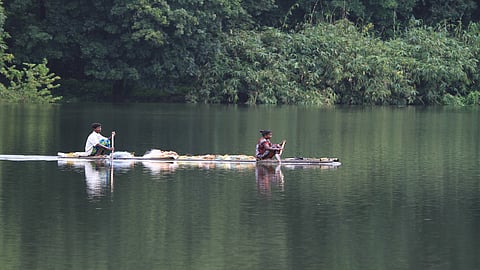

Guardians of the Forest
# Ajayan | Year 2012. At the zenith of the agitation against the proposed hydroelectric project at Vazhachal-Athirappilly in Thrissur district, eminent environmentalist Madhav Gadgil extended his unwavering support to the indigenous communities at the forefront of the struggle. In a statement of profound significance, he asserted, “The most effective means to prevent the realization of this project is to ensure the rigorous implementation of the Forest Rights Act, 2006. By doing so, you shall assume the role of custodians of the forest, thereby ensuring that any developmental endeavour on your ancestral land proceeds solely with your informed consent.”
These prescient words resonated deeply, and in 2014, following the official recognition of forest rights for the inhabitants of nine tribal villages in Vazhachal, their first collective decision was to unequivocally oppose the proposed hydroelectric project. Today, approximately 400 sqkm of forest land remain under their stewardship, exemplifying a model of indigenous conservation. This paradigm of environmental guardianship not only fortifies their inalienable rights over the land but also underscores why the Athirappilly hydroelectric project remains an unrealized aspiration of the State administration.
"The words of Gadgil Sir were a source of profound inspiration for us, and from that moment onward, we fought relentlessly to finally secure our independence," remarked Geetha, the urumoopathi (village head) of Vazhachal, encapsulating the spirit of their hard-fought struggle.
With the entire Vazhachal division, encompassing 400 sqkm, coming under the purview of the Forest Rights Act in 2014, a parallel initiative was set in motion in the neighboring Parambikulam Tiger Reserve. This concerted effort culminated in 2019, when the Act was successfully implemented in the region, extending indigenous stewardship over an expansive 500-sqkm stretch of contiguous forest. Today, these ecologically significant landscapes stand safeguarded under the rightful custodianship of the indigenous communities, ensuring the preservation of both biodiversity and cultural heritage.
In the aftermath of the devastating 2018 and 2019 floods, yet another proposal emerged - this time for a small hydel project in Sholayar. However, much like the Athirappilly project, this endeavour too has been relegated to a state of uncertainty, thwarted by the resolute and unified opposition of the forest's rightful custodians.
Mohanan, the head of the tribal village of Malakappara, one of the nine villages granted forest rights, described this historic recognition as a "revolutionary step", emphasizing that those who inhabit the forests possess unparalleled knowledge of their significance. He told Metro Vaartha about the intrinsic connection between the indigenous communities and their environment: “Forests are fundamental to the existence of all life under the sun. Our survival is inextricably linked to the forests, for we live within them and because of them. It is, therefore, our rightful duty to safeguard these ecosystems, and we alone possess the wisdom to determine what must be done. Forests are our very lifeline, and we will protect them.” As the leader of the co-ordination mechanism representing all nine villages, Mohanan stands as a steadfast guardian of this ecological legacy, reinforcing the communities' unwavering commitment to conservation. He asserts that even the present issue of human-animal conflict can be handled if the Act is implemented across all forests as the indigenous community knows how wild animals behave, a knowledge passed on through generations.
Behind this effort to restore custodian rights to the indigeneous people of Vazhachal was the World Wide Fund for Nature-India (WWF India) and its representative Tiju Chiramannil Thomas. The Forest Rights Act or The Scheduled Tribes and Other Traditional Forest Dwellers (Recognition of Forest Rights) Act, 2006, implemented in 2008, covers three areas - individual rights, community rights and development rights. While WWF entered the scene in 2008 and began preparatory works, the tribal department enforced the first part of these – individual rights. However, there were minor issues like hand-held land given to them being very limited.
As Tiju recounted to Metro Vaartha, the concerted efforts to advance this transformative vision bore remarkable success. In the discourse on community rights, it became imperative to centre the discussion on the specific needs and intrinsic relationship the people of Vazhachal share with their land. A pivotal aspect of this recognition was the formal acknowledgment of their right to access the forest, enabling them to sustainably gather non-timber forest produce such as honey, medicinal herbs, and other valuable resources, not only for subsistence but also for commercial endeavours.
This recognition extended beyond the terrestrial realm, encompassing the rivers that have long sustained their way of life. Here, the community was granted absolute fishing rights, reinforcing their autonomy over ancestral waters. Equally significant was the affirmation of their cultural sovereignty, bestowing upon them the right to continue their traditional practices, uphold sacred rituals, and protect the hallowed sites that embody their spiritual and historical heritage.
(Second part: Reviving forests, reclaiming rights through rightful custodians)
